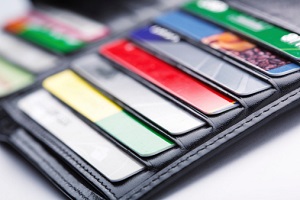 It is easier than you think to get into trouble with credit cards. You begin with one card and before you realize it, you have several credit cards with substantial balances. You may have several major credit cards in addition to store credit cards. Retailers entice customers to open an account by offering a discount on your first purchase. Of course, you only receive this discount if you charge the purchase on your new account. You open the account to “save money” with the intention to pay off the credit card next month. Unfortunately, many people find themselves making the minimum payments even though their intentions were to avoid them. By the time the balance is paid off, you have paid more money in interest than you saved on your first purchase.
It is easier than you think to get into trouble with credit cards. You begin with one card and before you realize it, you have several credit cards with substantial balances. You may have several major credit cards in addition to store credit cards. Retailers entice customers to open an account by offering a discount on your first purchase. Of course, you only receive this discount if you charge the purchase on your new account. You open the account to “save money” with the intention to pay off the credit card next month. Unfortunately, many people find themselves making the minimum payments even though their intentions were to avoid them. By the time the balance is paid off, you have paid more money in interest than you saved on your first purchase.
After a while, you may become tired of paying six to eight credit card payments each month. Even three or four credit cards can be difficult to manage and the minimum payments on each card can add up to several hundred dollars each month. It may be tempting to put all of your credit card balances onto the credit card with the lowest interest rate and then close the other accounts, but this is not a good idea.
Closing Credit Card Accounts Can Hurt Your Credit Score
In most cases, you should never close a credit card because it will hurt your credit score. A major element of your credit score is the length of credit. This is determined by reviewing the opening date of each credit account. If you pay off credit cards by transferring the balance to one account and closing the paid off credit card accounts, your length of credit may change. This could lower your credit score. Another element used to determine your credit score is the types of credit in use. The credit bureaus look at your mix of credit cards, retail accounts, and other forms of credit you may have and use the range of accounts to determine your score. A wider range of accounts looks better than fewer; therefore, closing all of your retail accounts could hurt your score.
Utilize the “Snowball Effect” to Pay Off Credit Cards
Rather than transferring the balances on your credit cards to one account, use the "snowball effect" to pay off your credit cards. Begin with the credit card account that has highest interest rate and pay as much as your budget will allow toward that account each month while making minimum payments on all other accounts. When you pay off that account, apply the money you were paying on the highest interest rate account to the account with the next highest interest rate and so on down the list as you work your way to the account with the lowest interest rate. This method of paying off credit card debt will reduce the amount of interest you pay while improving your credit score (you will have a higher amount of available credit that you are not using).
Use Credit Wisely
Once you have paid off your credit card debt, use your credit cards strategically in the future. Pay off balances in full each month to save interest and avoid becoming overwhelmed with credit card debt. If you must use a credit card for a large purchase that you cannot pay off in one month, use the card that has the lowest interest rate and pay as much as your budget will allow each month in addition to the minimum payment. When you use your credit cards, use the cards that have a “cash back” award and use those cards only for purchases that qualify for the “cash back.”
What Can You Do If You Cannot Pay Off Your Credit Card Debt?
In some cases, it may be impossible to pay off credit card debt because you lost your job, had an accident or medical emergency, or lost your spouse. Regardless of why you do not have the funds to pay your credit card debt, bankruptcy may be your best option to resolve your debt problems. Filing bankruptcy allows you to discharge credit card debt so that you can get back on your feet and begin rebuilding your finances for a stronger financial future. Bankruptcy gives you the fresh start you need while protecting your assets from creditors.
If you would like to learn more about debt consolidation and the pros and cons it entails, download our Debt Consolidation eBook.



